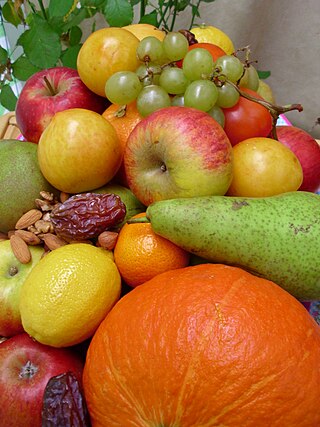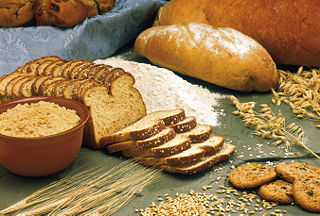Related Research Articles

Fruitarianism is a diet that consists primarily of consuming fruits and possibly nuts and seeds, but without any animal products. Fruitarian diets are subject to criticism and health concerns.

Child care, otherwise known as day care, is the care and supervision of a child or multiple children at a time, whose ages range from two weeks of age to 18 years. Although most parents spend a significant amount of time caring for their child(ren), child care typically refers to the care provided by caregivers that are not the child's parents. Child care is a broad topic that covers a wide spectrum of professionals, institutions, contexts, activities, and social and cultural conventions. Early child care is an equally important and often overlooked component of child's developments.

A healthy diet is a diet that maintains or improves overall health. A healthy diet provides the body with essential nutrition: fluid, macronutrients such as protein, micronutrients such as vitamins, and adequate fibre and food energy.
The Child Nutrition Act of 1966 (CNA) is a United States federal law (act) signed on October 11, 1966 by President Lyndon B. Johnson. The Act was created as a result of the "years of cumulative successful experience under the National School Lunch Program (NSLP) to help meet the nutritional needs of children." The National School Lunch Program feeds 30.5 million children per day. NSLP was operated in over 101,000 public and nonprofit private schools in 2007. The Special Milk Program, functioning since 1954, was extended to June 30, 1970 and incorporated into the act. The act also provided Federal funding assistance towards non-food purchases for school equipment.

A school meal is a meal provided to students and sometimes teachers at a school, typically in the middle or beginning of the school day. Countries around the world offer various kinds of school meal programs, and altogether, these are among the world's largest social safety nets. An estimated 380 million school children around the world receive meals at their respective schools. The extent of school feeding coverage varies from country to country, and as of 2020, the aggregate coverage rate worldwide is estimated to be 27%.

A food group is a collection of foods that share similar nutritional properties or biological classifications. List of nutrition guides typically divide foods into food groups and Recommended Dietary Allowance recommend daily servings of each group for a healthy diet. In the United States for instance, USDA has described food as being in from 4 to 11 different groups.

5 A Day is any of various national campaigns in developed countries such as the United States, the United Kingdom, France, and Germany, to encourage the consumption of at least five portions of fruit and vegetables each day, following a recommendation by the World Health Organization that individuals consume "a minimum of 400g of fruit and vegetables per day ." A meta-analysis of the many studies of this issue was published in 2017 and found that consumption of double the minimum recommendation – 800g or ten a day – provided an increased protection against all forms of mortality. In some places, people are being encouraged to aim for not just five portions a day, but seven.
Fruits & Veggies – More Matters is a national public health initiative from Produce for Better Health Foundation and Centers for Disease Control and Prevention (CDC) to increase the consumption of fruits and vegetables. This campaign, begun in 2007, took the place of the 5 A Day program. The shift was implemented in order to better communicate updated dietary guidelines, which recommended more than five servings of fruits and vegetables for some Americans.
Based in Washington, D.C., Leadership for Healthy Communities is a $10-million national program of the Robert Wood Johnson Foundation designed to engage and support local and state government leaders nationwide in their efforts to advance public policies that support healthier communities and prevent childhood obesity. The program places an emphasis on policies with the greatest potential for increasing sustainable opportunities for physical activity and healthy eating among children at highest risk for obesity, including African-American, Latino, American Indian and Alaska Native, Asian-American and Pacific Islander children living in lower-income communities. The foundation's primary goal is the reversal of the childhood obesity epidemic by 2015.
The Fruit & Vegetable Prescription Program, also known as FVRx, is one of three of Wholesome Wave’s programs. The program aims to provide under-served communities with fresh fruits and vegetables by allowing consumers to exchange healthcare provider-generated “prescriptions” for local fresh fruit and vegetables at participating, local farmers' markets.

The Healthy, Hunger-Free Kids Act of 2010 is a federal statute signed into law by President Barack Obama on December 13, 2010. The law is part of the reauthorization of funding for child nutrition. It funded child nutrition programs and free lunch programs in schools for 5 years. In addition, the law set new nutrition standards for schools, and allocated $4.5 billion for their implementation. The new nutrition standards were a centerpiece of First Lady Michelle Obama's Let's Move! initiative to combat childhood obesity. In FY 2011, federal spending totaled $10.1 billion for the National School Lunch Program. The Healthy, Hunger-Free Kids Act allows USDA, for the first time in 30 years, opportunity to make real reforms to the school lunch and breakfast programs by improving the critical nutrition and hunger safety net for millions of children. Healthy, Hunger-Free Kids Act and Michelle Obama were a step in transforming the food pyramid recommendation, which has been around since the early 1990s, into what is now known as "MyPlate".
Nutrition education is a set of learning experiences designed to assist in healthy eating choices and other nutrition-related behavior. It includes any combination of educational strategies, accompanied by environmental supports, designed to facilitate voluntary adoption of food choices and other food and nutrition-related behaviors conducive to health and well-being. Nutrition education is delivered through multiple venues and involves activities at the individual, community, and policy levels. Nutrition Education also critically looks at issues such as food security, food literacy, and food sustainability.
Wholesome Wave is a U.S. nonprofit organization that creates partnership-based programs that enable underserved consumers to make healthier food choices by increasing affordable access to health, locally and regionally grown foods. The organization addresses complex problems through simple solutions with a vision towards healthy, affordable food for all. Wholesome Wave operates two nutrition incentive programs, the Double Value Coupon Program and the Fruit & Vegetable Prescription Program, which tackle the issue of affordability for underserved consumers. Accessibility is emphasized through their supply chain work with food hubs, retail outlets and convenience stores. Wholesome Wave's innovative programs address the complex issues of food insecurity, farm viability, economic vitality of local communities, and diet-related diseases. Wholesome Wave was founded in 2007 by Michael Batterberry, Gus Schumacher and Michel Nischan.

MyPlate is the current nutrition guide published by the United States Department of Agriculture's Center for Nutrition Policy and Promotion, and serves as a recommendation based on the Dietary Guidelines for Americans. It replaced the USDA's MyPyramid guide on June 2, 2011, ending 19 years of USDA food pyramid diagrams. MyPlate is displayed on food packaging and used in nutrition education in the United States. The graphic depicts a place setting with a plate and glass divided into five food groups that are recommended parts of a healthy diet. This dietary recommendation combines an organized amount of fruits, vegetables, grains, protein, and dairy. It is designed as a guideline for Americans to base their plate around in order to make educated food choices. ChooseMyPlate.gov shows individuals the variety of these 5 subgroups based on their activity levels and personal characteristics.

The Farmers' Market Nutrition Program (FMNP) is a federal assistance program in the United States associated with the Special Supplemental Nutrition Program for Women, Infants and Children that provides fresh, unprepared, locally grown fruits and vegetables and nutrition education to WIC participants. Women, infants and children that have been certified to receive WIC program benefits or who are on a waiting list for WIC certification are eligible to participate in the FMNP.
The OrganWise Guys (OWG) was created in 1993 in Duluth, Georgia, to teach young children about the importance of making healthy choices in their lives through learning about their internal organs. The goal of OWG programming is to educate children and adults about nutrition and healthy living, and to prevent childhood obesity.
School meal programs in the United States provide school meals free of charge, or at a government-subsidized price, to U.S. students from low-income families. These free or subsidized meals have the potential to increase household food security, which can improve children's health and expand their educational opportunities. A study of a free school meal program in the United States found that providing free meals to elementary and middle school children in areas characterized by high food insecurity led to increased school discipline among the students.
The National Kidney Foundation of Michigan (NKFM) is a 501(c)(3) not-for-profit organization and subset of the National Kidney Foundation, a major voluntary health organization in the United States. Since 1955, the NKFM has carried out a mission to prevent kidney disease and improve the quality of life for those living with it. The nonprofit is based in Ann Arbor and has three additional statewide branches in Flint, Grand Rapids and Detroit. The charity has received 11 consecutive 4-star ratings from Charity Navigator, the nation's leading charity evaluator.
National Fruits & Veggies Month is a national observance and awareness campaign held in the United States during the month of September to educate about the health benefits of eating fruits and vegetables and to celebrate in song and culture how they are grown, distributed, and consumed. The awareness campaign consists of outreach to grocery stores and retailers and to schools and public organizations, outreach to nutritionists and other health professionals, weekly online contests with prizes, social media campaigns and logowear, and other special events during September to celebrate National Fruits & Veggies Month and inspire people to regularly consume fruits and vegetables and to create a more balanced lifestyle. The 'Take the Have A Plant pledge' is to "add one more fruit or vegetable to your routine, everyday this month." The year-long campaign surrounding 'Have a Plant' has monthly educational themes to be implemented by their Fruit and Vegetable Ambassadors in Action (FVAA) network.
References
- 1 2 "Regie's Rainbow Adventure". National Kidney Foundation of Michigan. Retrieved May 27, 2019.
- 1 2 National Kidney Foundation of Michigan (2016). Regie's Rainbow Adventure®: National Kidney Foundation of Michigan's nutrition education program for disease prevention in the early childcare setting. Front Edge Publishing. ISBN 9781942011668.
- ↑ "More children ready first day of school thanks to new United Way investment". United Way for Southeastern Michigan. Retrieved May 27, 2019.
- ↑ "Bringing For-Profit Marketing to Nonprofit Earned Revenue Model". EarlyWorks. Retrieved May 28, 2019.
- 1 2 3 Allen, E. B. (January 13, 2019). "Superhero helps kids learn healthy habits". The HUB Flint. Retrieved May 27, 2019.
- 1 2 "Center for Interactive Learning and Collaboration".
- ↑ "Health Fund Announces $8 Million in Grant Awards". Michigan Health Endowment Fund. March 28, 2017. Retrieved May 27, 2019.